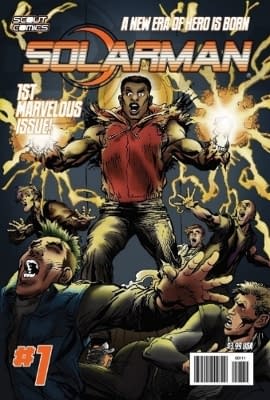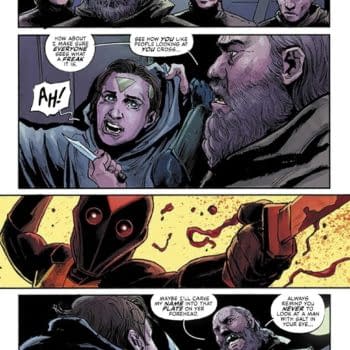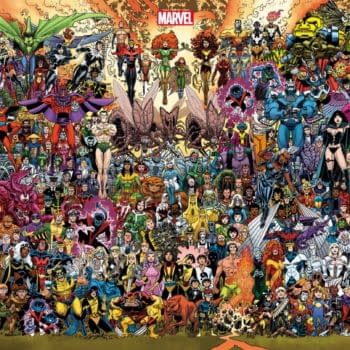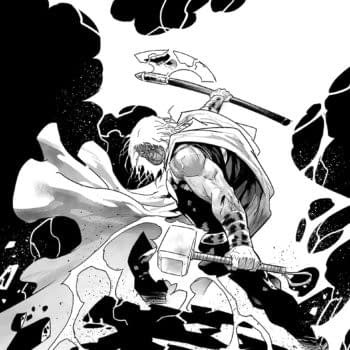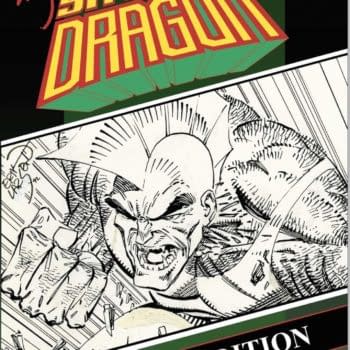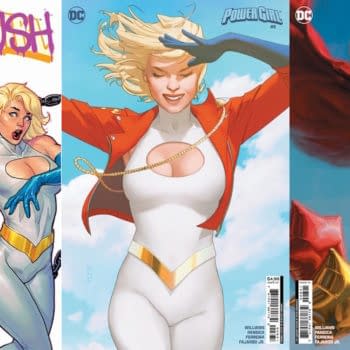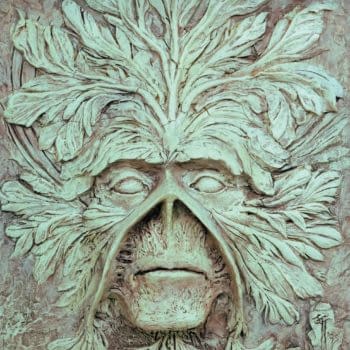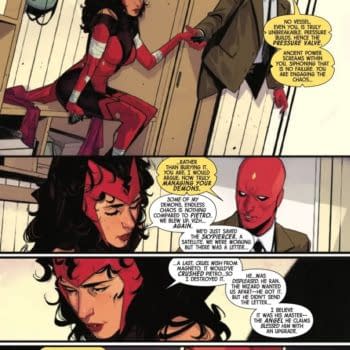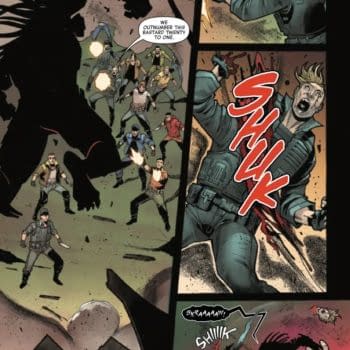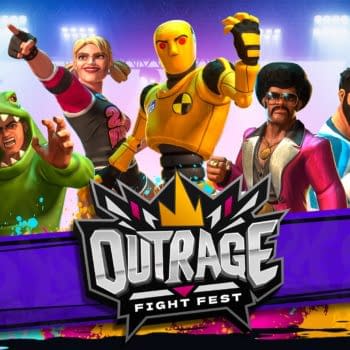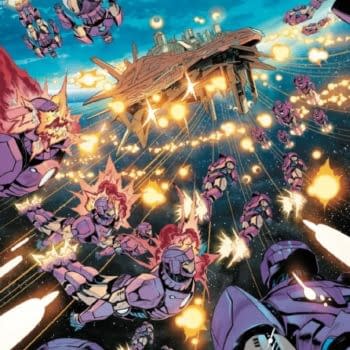Posted in: Comics | Tagged: Comics, entertainment, scatterbrain, solarman
A History In Publishing Comics From A Scatterbrain To A Solarman
I love comic books. The first ones I remember reading are Stan Lee and Steve Ditko's Spider-Man , and Stan and Jack Kirby's Fantastic Four. My oldest brother had paperback digest versions (this was either the late 70s or early 80s) and I couldn't believe my eyes. The characters, the colors, the amazing action and drama. There's something about the comic book format, the idea of serialized storytelling, that has captured my imagination from my earliest memories, and continues to do so today.
Little did I know way back then that someday would I not only write comic books but also publish them. I first started pitching ideas to Marvel and DC when I was in high school. For whatever reason, I always selected obscure characters, perhaps because I knew that the Big Two would never entrust Spider-Man or Batman to a 15 year old kid who wrote query letters on a crappy word processor. I came up with a fun Timberwolf (from The Legion Of Spuder-Heroes) concept, and a DC editor named Neal Pozner was very encouraging, and it seemed like my idea came fairly close to actually happening, though of course it didn't. I also pitched a bunch of ideas to Marvel: The Shroud, the "last" Invaders story, and a number of others. I can remember the stock rejection letters from each company, which had color illustrations of their superheroes, a real treat in the pre-internet age.
After college, I got busy with my career (in the film and publishing industries) but I still read comics and longed to write them. I started meeting editors at Marvel and DC but it was just as difficult to get a gig there as a thirty year old as it had been as a fifteen year old. While I was working at Dimension Films, I ended up meeting the Editor-in-Chief of a small UK comic book company, a guy named Rich Emms. We struck up an immediate friendship, cemented when Rich visited the United States and we took a field trip to the Wizard Magazine (R.I.P.) offices in Congers, New York. During the bus ride, we bonded over our favorite comics, like Claremont and Byrne's run on X-Men. I took a chance and pitched him a concept I had created during college, a superhero tale with a twist entitled Scatterbrain.
To my surprise, Rich loved the idea. Within a couple of years, the four issue Scatterbrain comic was released and I was suddenly a published comic book writer. It was 2006, I was 34 years old, and one of my earliest dreams had just come true. It was awesome. To top it off, I got blurbs from Robert Kirkman, Brian K. Vaughn and Michael Avon Oeming. Geoff Johns and Jim Krueger wrote introductions to the collected edition. I told myself that if Scatterbrain was the beginning and end of my comic book writing career, I'd be okay with that. Which was a total lie, of course.
A year or two later, Rich asked me if I'd be interested in coming up with a pitch for Flash Gordon. I'd seen the original Flash Gordon movie in the theater, in 1980, when I was 8, and I loved it. So my answer when Rich asked me if I wanted to take a shot at it? "Hells yes!"
I read all of Alex Raymond's original strips and crafted a reboot that stayed true to all of his tremendous characters and storylines, while also bringing the story into the 21st century. Then I was told that I had to tie the comic in to the upcoming SyFy TV series, so I read the first few scripts from the show and then created a Wrath Of Khan-type comic arc that would take place between episodes two and three (I still have that treatment somewhere, if there are any Flash Gordon historians reading this). Then the show came and went, and I was asked to go back to my original concept… and then it was official.
I was writing Flash Gordon. Me. The kid who bought thousands of comics as a kid and never in a million years would have thought he'd someday get a shot at a character as big as this.
And that's when our independent comic company, Ardden Entertainment (combining my and Rich's name) was born. In a world where DC was owned by Warner Brothers and Marvel was soon to be owned by Disney. No easy task to compete with those companies, let alone the larger independent comic companies. But we were publishing comics for all the right reasons, number one of which is that we love them.
Before I knew it, we had J.M. DeMatteis on board as our Editor-in-Chief, we were publishing not only Flash Gordon but also Casper The Friendly Ghost (renamed Casper And The Spectrals), and the Atlas Comics reboot with Jason Goodman, the grandson of Marvel Comics' founder Martin Goodman, and we co-published The Island Of Misfit Toys. We also published a number of fantastic creator-owned comics. Things went up and down, like they do for any small, new business. J.M. left. Mike Grell came on board. Some books worked, others didn't.
Last year, after many years of people not being able to spell or pronounce "Ardden," we decided it was time to change the company name. We ran through many, many ideas, finally settling on Scout Comics. It had the right mix of fun and forward thinking.
Around the same time, at this past October's NYCC, I was approached by a gentleman named Dave Oliphant. He told me about Solarman, a character originally published by Marvel Comics and written by Stan Lee, but owned outright by Dave. Looking through issues #1 and #2 from 1989 (which I recognized from my childhood), I immediately got it. This would be Scout's debut title. It was a fun character, it had an unbelievable legacy, and we specialize in rebooting older properties while staying true to their core concepts (Flash Gordon, Casper, the Atlas books, The Island Of Misfit Toys, etc).
The Scout team grew and we announced the new Solarman, which we are producing with an amazing company out of Europe named Deadline. We brought on a talented creative team and also got a cover from the legendary Neal Adams. In addition, we announced two super-cool creator-owned books, Henchgirl and Sabretooth Dan, strengthening our commitment to produce independent comics about and by a diverse group of people.
We are all so ready to dismiss things because it's easy or funny. I did the same thing recently with the Paddington movie. When the first image came out for the movie, everyone on the internet was talking about how "creepy" it was, and I agreed. I made up my mind at that moment that I didn't like the movie.
Well, recently my wife, two daughters and I watched Paddington and it was great. It was one of the best family films I've ever seen. My first impression was totally wrong.
We all know that the comic industry struggles to find and keep its fans. Put aside the Big Two and phenomena like The Walking Dead. There are a number of independent comic publishers out there but we all fundamentally want the same thing: a healthy industry where the "little guy" has as good a shot at finding an audience as the Big Two. But that means we need to give indie books a chance, on the retail, critical and consumer levels. And I'm guilty of this myself. I grew up loving Marvel and DC, and I have tended to buy those books, but I'm changing my ways. I'm actively seeking out indie books.
I'm really excited about Scout Comics, but I'm also cautiously optimistic about the comic industry as a while. While Marvel and DC can secretly war and converge, I encourage anyone and everyone reading these words to give indie books a chance, especially by pre-ordering the book. Indie publishers love comics as much as you do, so why not give one indie book you've never heard of a try the next time you're in a comic shop? And if it happens to be Solarman #1? I can live with that, and it just so happens to be available for pre-order right now.
Long live comics, big and small!


